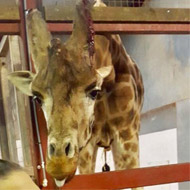
‘Trouble at the zoo’ highlights problems at South Lakes Safari Zoo
International wildlife organisation Born Free has reiterated its call for an overhaul of zoo licensing and inspections.
The call follows a BBC2 documentary, Trouble at the Zoo, which revealed a host of incidents at South Lakes Safari Zoo following its takeover by new management. The incidents included unreported deaths, animals being poisoned and a lack of participation in unrecognised breeding programmes.
Born Free president and co-founder Will Travers said the events call into question whether the new management is up to the task and if the government’s zoo licensing regime is fit for purpose.
“All zoos receive their operating licence from the local authority in which they are located," he said. "The withdrawal of such a licence and the consequent closure of a zoo - with the loss of jobs and revenue to the local community - may represent a conflict of interest and make taking necessary action - such as withdrawing a zoo licence - by a local authority far harder.
“The question of what to do with the animals in the event of zoo closure - also a responsibility of the local authority - is likely to be a further disincentive to resolute but difficult decisions."
He continued: “As always, there are victims when things are allowed to go wrong. In this case the 486 animals who died between December 2013 and September 2016, but also the keepers who, in many cases, have tried their best under the circumstances. It is the owners of the zoo and the local authority who must explain themselves and accept the consequences of their action or inaction.”
In 2017, an inspection revealed that almost 500 animals had died at South Lakes Safari Zoo in just four years. As such, zoo founder David Gill was refused a licence to run the zoo and the Cumbria Zoo Company Ltd took over.
‘Trouble at the Zoo’ followed South Lakes Safari Zoo as it tried to rebuild its reputation. However, it showed upsetting footage of animal deaths - including a lion and two red panda cubs - and the feeding of animals with food deemed not fit for human consumption.
Nero the lion died last July after eating meat that was contaminated with barbiturate poison. Two months after Nero’s death, however, it appeared that the zoo was still ordering meat from the same supplier.
Flocking to Twitter, viewers recognised the hard work and dedication of the keepers. But many had concerns that the zoo was putting profit over animal welfare:
Matryoshka said: “Watching Trouble at the Zoo it was hard to see any redeeming features of the senior staff, who are running the place like a dodgy garage. The few dedicated keepers and beautiful animals living there deserve better.”
Michael Apter said: ‘This Trouble At The Zoo documentary on @BBCTwo is a devastating example of absolutely incompetent, selfish people being given responsibility for something far beyond their capacity and capability. @barrowcouncil should be ashamed they gave them another chance.”



 The Veterinary Medicines Directorate (VMD) is inviting applications from veterinary students to attend a one-week extramural studies (EMS) placement in July 2026.
The Veterinary Medicines Directorate (VMD) is inviting applications from veterinary students to attend a one-week extramural studies (EMS) placement in July 2026.